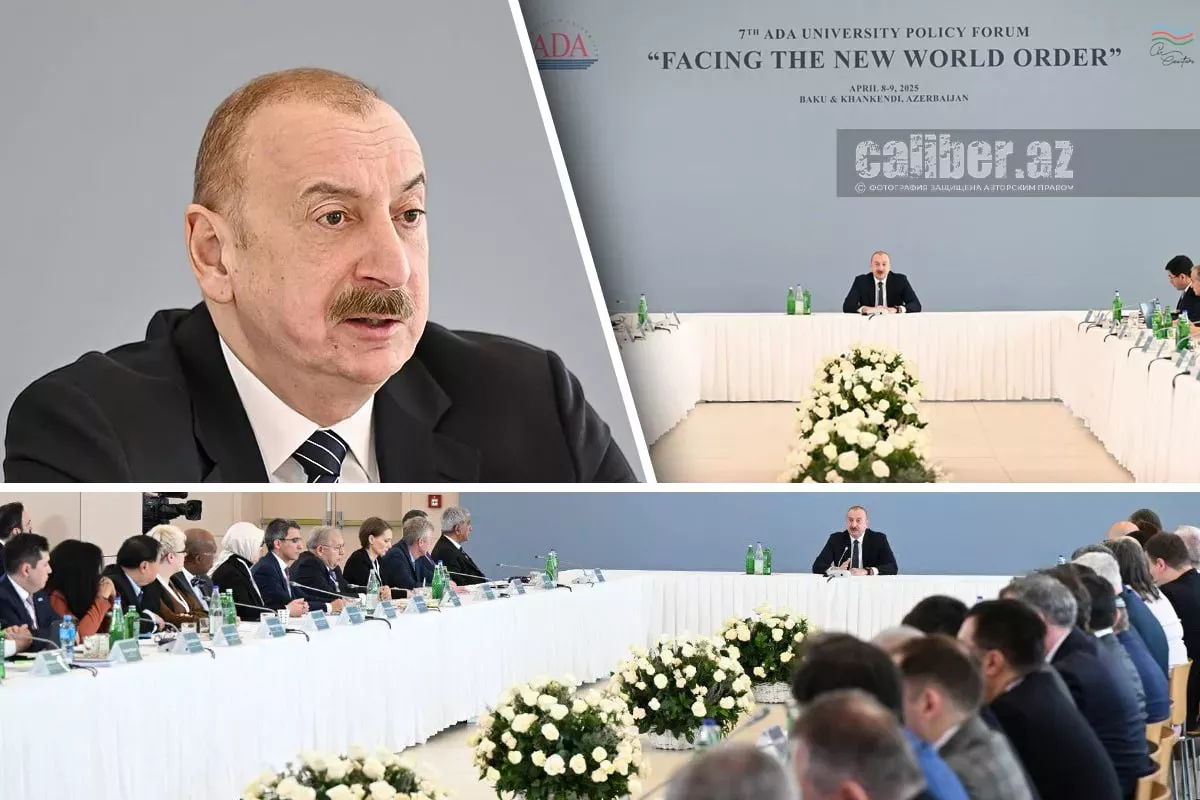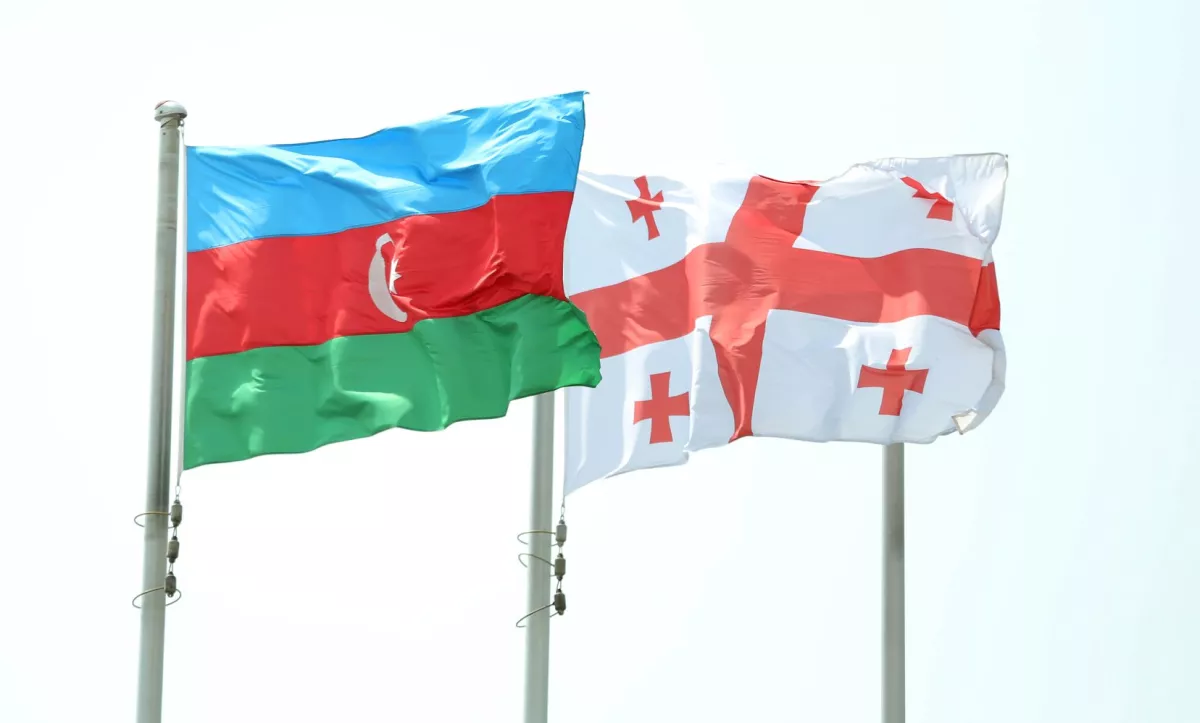Georgia is not alone: Strategic support from Baku A vital alliance
On April 9, an international forum titled “Facing the New World Order” was held at ADA University in Baku. At the event, Azerbaijani President Ilham Aliyev delivered a speech in which he placed special emphasis on Georgia and the friendly, neighbourly relations between the Georgian and Azerbaijani peoples. President Aliyev made it clear that Azerbaijan firmly supports Georgia’s sovereignty and believes that all of the country’s internal matters should be decided solely by the Georgian people.
Thanks to the cooperation and mutual support between Georgia and Azerbaijan, the geopolitical importance of the South Caucasus has significantly increased in recent years. The region now serves as a key transit hub with immense development potential, particularly through the Middle Corridor. It is no coincidence that, highlighting the long-standing friendship, partnership, and high level of mutual understanding between Georgia and Azerbaijan since the early days of their independence, Ilham Aliyev stated: “Definitely relations with Georgia are of strategic importance for us. And due to the historical connections between our peoples, our mutual past of being non-free and non-independent, and also the period of independence, where, from the very beginning, Georgia and Azerbaijan demonstrated a very high level of mutual understanding, partnership, friendship, and actually managed to transform the region of the South Caucasus into a strategically important one. It was done by us — only by Georgia and Azerbaijan,” said Ilham Aliyev.

Azerbaijani President Ilham Aliyev also emphasised in his speech that the European Commission's current stance towards Georgia’s internal affairs is absolutely unacceptable. According to President Aliyev, this behaviour is reminiscent of colonial powers, attempting to interpret the will of the Georgian people through the lens of a colonial past.
“Frankly speaking, I was surprised when I was informed about the comments of the President of the European Commission, Madame Ursula Von Der Leyen, which she made in Uzbekistan, at the Summit of Central Asian leaders with the leadership of the European Commission, when she was talking about opening the borders between Azerbaijan and Armenia, and Armenia and Türkiye, in order to facilitate the Middle Corridor, as they call it in Europe, the Global Gateway. That was very strange, because this corridor exists, and Armenia plays no role in that. We can understand the feelings of European bureaucrats towards Armenia, but you cannot ignore the map. And we, in Georgia and in Azerbaijan, have provided all those facilities, which today help Europeans communicate with Central Asia — Georgian seaports, the Baku-Tbilisi-Kars railroad, the Azerbaijani seaport in Alat, Caspian shipping, which is instrumental in transportation. All that is ignored — how much money was invested? All that is ignored; they only want to open the border between Türkiye and Armenia, open the border between Armenia and Azerbaijan. What does Europe have to do with that? It's none of their business. Relations between Türkiye and Armenia, and Azerbaijan and Armenia — the longer the distance between the European Union and these issues, the better for everyone.
But there was not a single word about Georgia. As if Georgia did not exist. This is unfair, and the attitude towards Georgia's internal process in the European Commission is absolutely unacceptable. This is the behavior of colonialists. They try to look at the will of the Georgian people through the principles of a colonial past. This is absolutely unacceptable, and the people of Georgia know that we are with them, and the government of Georgia knows. The internal issues of Georgia must be resolved by the Georgian people, not by bureaucrats from Brussels. So, with respect to all that, we need to strengthen our partnership between Georgia and Azerbaijan,” said President Aliyev.
Ilham Aliyev’s remarks came on a day of deep significance and sorrow for Georgia – April 9. Thirty-six years ago, the dying Soviet empire, which had already sown the seeds of separatism in Abkhazia (following the same model later applied to instigate the so-called "Artsakh" separatism in Azerbaijan’s Karabakh), brutally suppressed a peaceful demonstration in Tbilisi opposing separatism.
Less than a year later, that same empire would spill even more blood during the tragic events of “Black January” in Baku. The state sovereignty of both Georgia and Azerbaijan was won at an enormous cost. Yet today, the Georgian people are being subjected to what amounts to an ultimatum: to surrender their country’s sovereignty to a “new empire” and its bureaucracy in Brussels. In such circumstances, Georgia needs the support of a friendly nation – Azerbaijan – more than ever.
It is profoundly symbolic for Georgia that on such a meaningful day for the Georgian people, Ilham Aliyev declared his firm support for Georgia’s sovereignty.
It is also worth recalling the role played by Armenian nationalists—both during the events of April 9, 1989, and in the European Commission’s current obsessive attempts to reroute transit through Armenia while ignoring Georgia and its national interests. Then and now, Armenian nationalists have exploited "imperial" forces to undermine and trample Georgia. During the collapse of the Soviet empire, Georgia was confronted by supposedly "pro-imperial" separatists. Today, attempts are being made to destabilise the country by empowering "pro-European" forces from within—forces that have already tried to stage a Maidan-style uprising—and through external pressure from Brussels.

Having failed to orchestrate a coup and violent power grab by the "pro-European" opposition in Georgia, the European Commission is now attempting to redirect key transit routes to bypass Georgia altogether, favouring Armenia, which currently displays its "loyalty to Europe." Ursula von der Leyen is already speaking with the leaders of Central Asian countries about the opening of the Turkish-Armenian and Armenian-Azerbaijani borders as though it were a done deal. She is imposing on Tbilisi’s transit partners—who have long cooperated fruitfully with Georgia—a route that exists only in theory, without even consulting Türkiye, Azerbaijan, or Georgia on whether they agree to reroute the Middle Corridor through Armenia.
It is clear that for the European Union, it would be advantageous in the long run to maintain control over the transit routes in Eurasia, using Armenia, which is willing to follow the lead of Paris and Brussels. By effectively "ignoring" transit through Georgia and attempting to reroute the entire Middle Corridor transit through Armenia with the opening of the Armenian-Turkish and Armenian-Azerbaijani borders, the EU gains a kind of "Armenian valve" that it could shut off at any time. This, of course, comes with the added strategic benefit that, by excluding Georgia from the Middle Corridor, Armenia would gain a disproportionate lever of influence and pressure not just on Azerbaijan and Türkiye, but also on the entire Turkic world.
Armenia once had all the potential to become a transit country and build friendly, neighbourly relations with both Türkiye and Azerbaijan. Moreover, Armenia could have had a far more convenient route to Russia via a unified Georgia. All this would have been possible without demanding "miatsums" or fueling separatism (including on Georgian territory), without unleashing wars, and carrying out ethnic cleansings.
Now, after immense sacrifices and the devastation of Azerbaijani territories occupied for decades, with the consequences of separatism in Georgia still not fully resolved, and with refugees displaced by nationalists both from the Republic of Armenia and from Georgian Abkhazia yet to return to their homes, Armenia, with the help of its "European friends," seeks to become the "main transit country" in the Caucasus. This would allow Armenia to hold Türkiye and Azerbaijan hostage with its leverage, essentially "shutting off" Georgia from transit routes. Are these demands not too grandiose?

It is no coincidence that, in his opening speech at the international forum at ADA University, Ilham Aliyev pointed out that the Armenian occupation of Azerbaijani territory prevented this part of the world from becoming a more integrated region and deprived Armenia itself of the opportunity to become an important transit country for Azerbaijani energy resources and transport routes. "It's their fault that they miscalculated the future development and sacrificed their economic future, their real independence for this dream of ‘great Armenia’," said the President of Azerbaijan.
Therefore, the idea of the "exclusivity" of transit through Armenia, and replacing the dynamically developing transit through Georgia along the Middle Corridor with it, is untenable. Moreover, the way the European Commission is attempting to lobby such a transit venture and punish Georgia for its "defiance" shows that, in the current complex geopolitical situation, the friendship and cooperation with Azerbaijan and Türkiye enable Georgia to preserve and strengthen its state sovereignty.
Vladimir Tskhvediani, Georgia, exclusively for Caliber.Az








